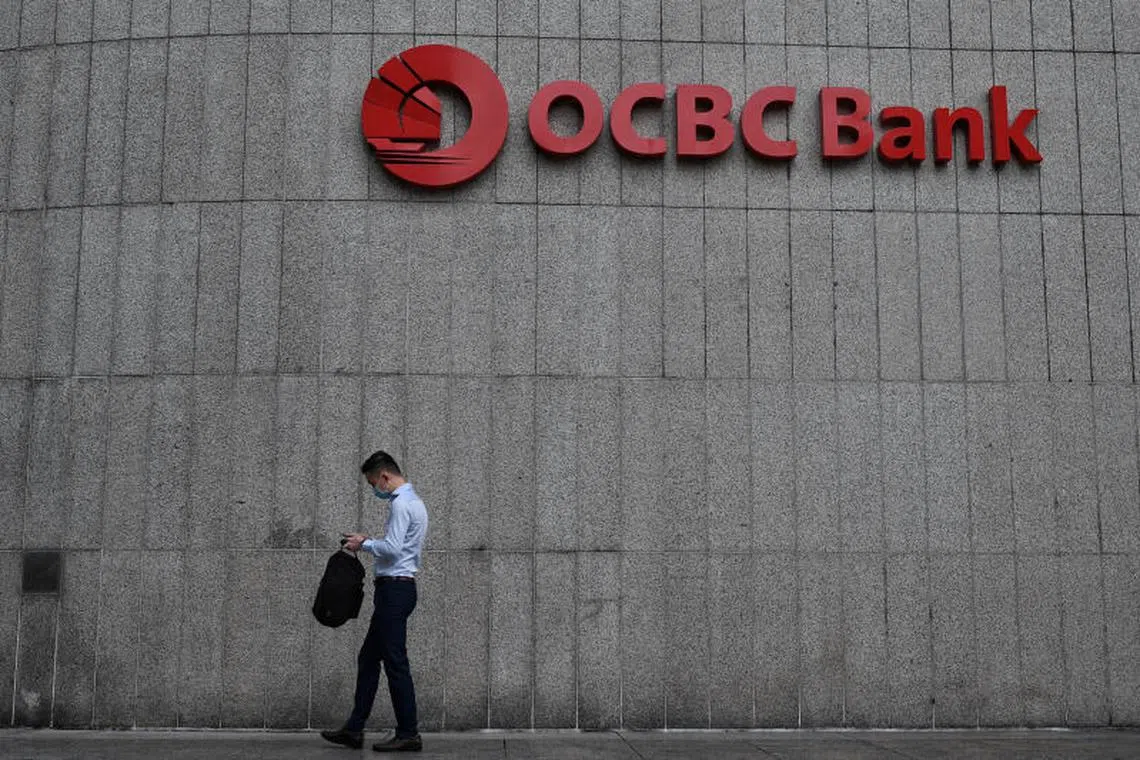OCBC sees 34% rise in Q4 profit, driven by higher interest rates even as fee income falls
Sign up now: Get ST's newsletters delivered to your inbox

Net profit at OCBC rose to $1.31 billion for the three months to December from a year earlier.
ST PHOTO: KUA CHEE SIONG
Follow topic:
SINGAPORE – OCBC Bank rounded up fourth-quarter results for local banks on Friday, staying cautiously optimistic on its outlook, with global interest rates likely to peak in the second half of this year.
The surge in interest rates drove OCBC to a 34 per cent jump in net profit to $1.31 billion for the three months to December from a year earlier, even as income from wealth management fees and its insurance business fell sharply.
The figure was below the $1.6 billion average estimate based on four analysts polled by Bloomberg.
For the full year, earnings rose 18 per cent to a new high of $5.75 billion from $4.9 billion.
A final dividend of 40 cents per ordinary share was proposed, bringing 2022 dividend to 68 cents, up 15 cents or 28 per cent from the previous year.
OCBC targets to pay out 50 per cent of earnings as dividends going forward, although group chief executive Helen Wong has not ruled out a higher rate such as the fourth quarter’s 53 per cent payout ratio.
Non-interest income tumbled 42 per cent to $615 million, mainly due to lower wealth management fees as a result of subdued customer investment activities and valuation losses for OCBC’s insurance arm Great Eastern.
Ms Wong said at a briefing on Thursday that OCBC sees “upward potential for wealth management fees” as the interest rate cycle comes to an end and investors have more confidence in the markets.
“We are thinking that non-interest income should have a more rapid growth in percentage terms than net interest income,” she added.
Assets under management for the wealth business were higher at $258 billion compared with $257 billion a year ago, driven by continued growth in net new money inflows into the business.
OCBC’s head of global consumer financial services Sunny Quek said the net new money inflows were about $25 billion for the whole of last year. The bank has wealth management businesses under OCBC and Bank of Singapore, its private banking arm.
Phillip Securities research analyst Glenn Thum said the recovery in wealth management fees will be an important growth driver this year for OCBC and its peers, DBS Bank and UOB. Mr Thum said that because of such a low base that the banks had last year, there is no other way but for fee income to go up, with expectations for “minimum double-digit growth for fee income” for all three players.
OCBC’s net interest income for the fourth quarter surged 60 per cent to $2.4 billion, driven by a rise of 79 basis points in net interest margin (NIM), a key gauge of profitability.
Ms Wong said that interest rates are expected to remain high as inflationary pressures linger. OCBC forecast NIM of 2.1 per cent for this year versus 1.91 per cent in 2022, and mid-single-digit growth in what she calls “quality loans”.
While forecast NIM for 2023 is higher versus 2022, it is off the peak of 2.31 per cent that the bank recorded in the fourth quarter.
Ms Wong said there is still competition for deposits and banks’ funding costs will go up as they pass on some of the interest rate increases to depositors.
She said low-interest Casa (current and savings accounts) deposits have also been dropping as customers move their funds into fixed deposits – OCBC’s Casa ratio fell from 62.7 per cent in the first quarter of 2022 to 51.8 per cent in the fourth quarter.
As there will be “some more catch-up on the funding side” but not a lot of upside on the loan side, the bank is preferring to stay conservative on its NIM estimates for 2023.
Mr Pramod Shenoi, head of Asia-Pacific financial research at CreditSights, said that like DBS and UOB, OCBC is expecting NIM to pick up in the first half of the year before declining due to higher funding costs flowing through.
Mr Shenoi added that “there is also the possibility of stronger competition for loans, which may make it difficult to price loan packages higher”. Hence, he said, “the 2.1 per cent to 2.25 per cent range for NIM for the three banks seems fair”, adding that “there should be some upside” for OCBC’s NIM.
Singapore bank shares closed higher on Friday, reversing Thursday’s fall. OCBC rose 0.24 per cent to $12.67, while DBS climbed 0.18 per cent to $34.40 and UOB advanced 0.78 per cent to $29.85.


